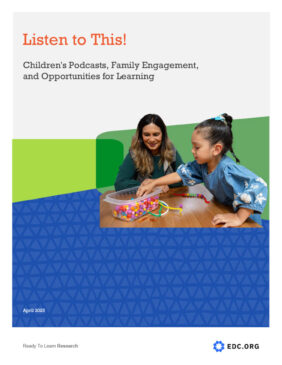
While podcasts have been a popular source of entertainment and information for adults for well over a decade, children’s podcasts have been gaining momentum just over the past few years. In 2024, 46% of children ages 6–12 had listened to a podcast, according to a market research study.[1] Despite the increasing popularity of podcasts among young audiences, little research has explored how children and families engage with children’s podcasts or the potential benefits of listening. Research has shown that children can benefit from using media, especially when they use it alongside a parent or caregiver[2], and podcasts may be particularly well-suited for parents and children to engage with together.
Researchers at Education Development Center (EDC) conducted an exploratory study of family experiences with children’s podcasts. We sought to explore the contexts and characteristics of children’s podcast use and podcasts’ potential as a tool for learning and for fostering shared media experiences among family members. We recruited 110 families with a child aged 4–8. The study team shared eight podcasts with them over the course of six weeks: primarily podcasts that were funded by Ready To Learn and/or distributed by PBS KIDS. Families were asked to choose one podcast to listen to every two weeks, and parents completed biweekly surveys and interviews to report about their family’s experiences with the podcasts they listened to.
Our findings support the potential of podcasts as an engaging new medium for young children and their families. Below, we highlight the findings related to shared family media experiences, the significance of these findings, and implications for creators.
What we learned
Families listened together easily. While it can sometimes be challenging for parents to find the time to watch visual media with their children, the accessibility and portability of podcasts make it easy for families to integrate them into their daily lives. Researchers collected 319 surveys from parents or caregivers throughout the study. Of those, 92% indicated they listened with their child. They predominantly reported listening to podcasts at home while winding down for bed (56%), playing (50%), or while commuting (39%). Parents appreciated the ability to multitask while listening, and some noted how well the length of podcast episodes fit into their routines. As one parent of a 7-year-old said, “Some of them are, like, 13 to 15 minutes. I think it’s a good cap because it would be a car ride, a little errand, or the walk to school or falling asleep.”
Podcast content sparked activities and conversations between parents and children. Parents indicated in more than half of the survey responses (55%) that they engaged in activities inspired by a podcast. From imaginative play, to researching a topic they learned about in an episode, to exploring new events or places in their neighborhood, the podcasts created opportunities for families to extend learning beyond listening. Additionally, parents indicated in 83% of their survey responses that they had conversations about the podcast with their children during or after listening. Because the podcasts provided in the study covered a wide range of topics, families’ conversations also varied greatly, including recapping episodes and talking through how situations in the shows related to situations in their own lives.
Listening together sparked parents to ask their child questions about the content. This kind of scaffolding was important for children who were struggling to adjust to the audio medium and also created opportunities for deeper engagement with the content and with one another. One parent of a 6-year-old said, “She will tell me, ‘Mommy ask me questions now.’ So … I guess she liked that interaction. Like, she started expecting the questions that I was going to ask to see if she understood. [S]he will tell me, ‘Talk to me about it,’ and then I will explain to her. So, it’s a beautiful interaction.”
Parents felt that podcasts had educational value for their children and for themselves. While this study did not directly examine learning outcomes, parents indicated in 92% of survey responses that they thought the podcasts they listened to were educational for their child. Parents reported their child learned a range of things, partly depending on the content of the podcast. Views on what children learned included academic content like math or literacy, as well as critical thinking, problem-solving, and social skills. Some parents also reported that the audio-only format challenged their child to sharpen their listening skills and use their imagination to envision what they heard.
Notably, learning opportunities were not just for children. Many parents reported that they, too, learned about a new topic from a podcast, while others learned more about their child and how to communicate with them better. One parent of a 6-year-old explained, “I learned well through the process of getting her interested in [the podcast], and it helped me to build a better connection with her and my [other] kids … Because I had to figure out new ways of engaging with them.”
Takeaways
Children benefit when families use media together. However, limited time and attention keep parents from sitting and watching content with their children. Flexibility is crucial for families to engage with media together. As parents continue to navigate their children’s media consumption, podcasts offer an engaging, accessible option. Many children’s podcasts are available to stream at no cost on different platforms, and the portability of audio-only media allows families to listen wherever, whenever.
As with all quality children’s media, podcasts can and should be designed to meet not only children’s needs, but also their parents’ needs. Children were most engaged with podcast content that featured familiar or relatable characters, had interactive prompts, musical segments, opportunities to solve problems, and unfamiliar topics. Parents in our study particularly appreciated when the content was as interesting to them as to their child, taught them something new, or offered clear avenues to engage their child in conversation or activities beyond listening. For both parents and children, serial narratives featuring cliffhangers were particularly popular, giving families the chance to guess and discuss what might happen next.
The findings from this study demonstrate that even when podcasts are not explicitly educational, there are opportunities for children to learn something, and parents can play a crucial role in supporting that learning.
How to find children’s podcasts
There are lots of great podcasts available for children and families, and podcasts are easy to find! Although a quick Google search of “children’s podcasts” yields lists of recommendations from trusted sites, searching together for a podcast can be an opportunity for joint media engagement and learning. Parents can ask their child about the kind of podcast they are interested in listening to (like “something about animals”) and look for options together via a search engine or a streaming service. For example, the podcasts used in this study are available on PBS KIDS (e.g., PBS KIDS website, PBS KIDS Video app) and other streaming services (e.g., YouTube, Spotify). Families can see if their favorite television show has an associated podcast on that program’s website. Many local public media stations also produce children’s podcasts.
To learn more about our research, read the full study report and report summary here.
This study, and some of the podcasts it explores, were developed as part of the Ready To Learn Initiative led by the Corporation for Public Broadcasting and the Public Broadcasting Service (PBS) and funded by the U.S. Department of Education. The Initiative focuses on developing and distributing innovative, high-quality media to support children’s school readiness and early school success.
The contents of this blog post and the linked research report were developed under a grant from the Department of Education [PR/Award No. S295A200004, CFDA No. 84.295A]. However, those contents do not necessarily represent the policy of the Department of Education, and you should not assume endorsement by the federal government.
[1] Edison Research. (2024). Kids podcast listener report [PowerPoint Slides]. https://www.edisonresearch.com/wp-content/uploads/2023/07/Kids-Podcast-Listener-Report-webinar-deck-Exporting-most-updated.pdf
[2] E.g., Barr, R. (2019). Growing up in the digital age: Early learning and family media ecology. Current Directions in Psychological Science, 28(4), 341–346. https://doi.org/10.1177/0963721419838245; Barr, R., & Kirkorian, H. L. (2023). Reexamining models of early learning in the digital age: Applications for learning in the wild. Journal of Applied Research in Memory and Cognition, 12(4), 457–452. https://doi.org/10.1037/mac0000132; Dore, R. A., Hassinger-Das, B., Brezack, N., Valladares, T. L., Paller, A., Vu, L., Golinkoff, R. M., & Hirsh-Pasek, K. (2018). The parent advantage in fostering children’s e-book comprehension. Early Childhood Research Quarterly, 44(3), 24–33. https://doi.org/10.1016/j.ecresq.2018.02.002; Silander, M., Grindal, T., Hupert, N., Garcia, E., Anderson, K., Vahey, P. & Pasnik, S. (2018). What parents talk about when they talk about learning: A national survey about young children and science. Education Development Center, Inc., & SRI International.

Libby Hunt is a researcher at Education Development Center. Her current research focuses on how media can foster shared family experiences and support children’s learning of various domains in both formal and informal contexts. Libby holds a Master’s degree in Child Study and Human Development from Tufts University.

